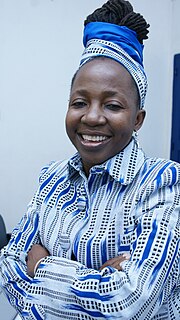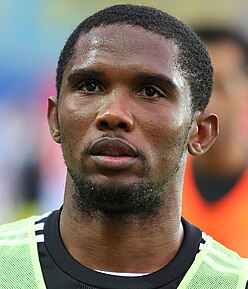Peter Mafany Musonge is a Cameroonian politician who was Prime Minister of Cameroon from September 1996 to December 8, 2004.

The Congress for Democracy and Progress was the ruling political party in Burkina Faso until the overthrow of Blaise Compaoré in the year 2014.

Ni John Fru Ndi is a Cameroonian politician. He founded the Social Democratic Front (SDF), the main opposition party in Cameroon, in 1990, and he has led the party since then.
Saleh Kebzabo is a Chadian politician. He is the President of the National Union for Democracy and Renewal (UNDR) and a Deputy in the National Assembly of Chad.

The Social Democratic Rally is a political party in Niger. Its president is Amadou Cheiffou and its first secretary-general is Mahamadou Ali Tchémogo.

Laurent Esso is a Cameroonian politician who has held a succession of key posts under President Paul Biya since 1988. He served in the government of Cameroon as Minister of Justice from 1996 to 2000, Minister of Public Health from 2000 to 2001, Minister of Defense from 2001 to 2004, and Minister of Foreign Affairs from 2004 to 2006. Subsequently, Esso was Secretary-General of the Presidency, with the rank of Minister of State, from September 2006 to December 2011. He has again served as Minister of Justice since December 2011.
The National Union for Democracy and Progress is a political party in Cameroon, drawing its main support from the north of the country. It was established as an opposition party in the early 1990s and won the second largest number of seats in the 1992 parliamentary election. The UNDP's National President is Maigari Bello Bouba, who is currently a Minister of State in the government.
Dakole Daïssala is a Cameroonian politician and the President of the Movement for the Defense of the Republic (MDR), a political party based in Cameroon's Far North Region. He served in the government of Cameroon as Minister of State for Posts and Telecommunications from 1992 to 1997; subsequently he was a Deputy in the National Assembly from 1997 to 2002 and then Minister of Transport from 2004 to 2007. He has served in the Senate since 2013.

Edgar Alain Mebe Ngo'o is a Cameroonian politician who has occupied multiple positions in the government of Cameroon and has served in the government of Cameroon as Minister of Transport from 2015 to 2017. An important security official, he was Delegate-General for National Security from 2004 to 2009 and Minister-Delegate at the Presidency for Defense from 2009 to 2015.
René Emmanuel Sadi is a Cameroonian politician who has served in the government of Cameroon as Minister of Territorial Administration since 2011. Under President Paul Biya, he was Second Assistant Secretary-General of the Presidency from 2004 to 2009 and Minister for Special Duties from 2009 to 2011. Sadi also served as Secretary-General of the Central Committee of the Cameroon People's Democratic Movement (RDPC), the ruling political party in Cameroon, from 2007 to 2011.
Pierre Claver Maganga Moussavou is a Gabonese politician who has been Vice President of Gabon since 2017. He is the President of the Social Democratic Party.

Issa Tchiroma Bakary is a Cameroonian politician who served in the government of Cameroon as Minister of Transport from 1992 to 1996 and has been Minister of Communication since 2009. He is the President of the Front for the National Salvation of Cameroon, a minor political party.

Marcel Niat Njifenji is a Cameroonian politician who has been President of the Senate of Cameroon since 2013. A member of the ruling Cameroon People's Democratic Movement (RDPC), he previously served for years as Director-General of the National Electricity Company, and he was also a minister in the government during the early 1990s.
Akere Tabeng Muna is a Cameroonian lawyer who is currently the Chairman of the International Anti-Corruption Conference Council. He is also the Sanctions Commissioner of the African Development Bank Group and a Member of the High-Level Panel on Illicit Financial Flows from Africa. He previously served as the Vice-Chair of Transparency International, and he has presided over the Economic, Social and Cultural Council (ECOSOCC) of the African Union, the Pan African Lawyers Union and the Cameroon Bar Association.

Edith Kahbang Walla, popularly known as Kah Walla, is a Cameroonian politician, entrepreneur and social activist. She went into politics in 2007 with the Social Democratic Front (SDF), the main Cameroonian opposition party and was then elected into the municipal council of Douala I. In 2010, she resigned from SDF following a divergence over strategy and declared her intention to run for the 2011 presidential election on October 23, 2010. On April 30, 2011, she was elected as the president of the Cameroon People's Party (CPP) and party candidate for 2011 presidential election.

Ama Tutu Muna is a Cameroon politician who was the Minister of Arts and Culture from 2007 to 2015.

Joshua Osih is a Cameroonian politician. He was the vice president of the main opposition party in Cameroon, the Social Democratic Front (Cameroon) (SDF), and the first Anglophone Cameroonian to serve as a Parliamentarian in Douala, capital of the Littoral Region (Cameroon) in 2013. He is also the chairman of Camport PLC in Cameroon.
Believe in Cameroon is a political party in Cameroon. The party places a heavy emphasis on agricultural issues which it believes is a key part of the country's socio-economic development. Bernard Njonga, the founder of CRAC, is a candidate in the 2018 presidential elections.
United People for Social Renovation is a political party in Cameroon.

















